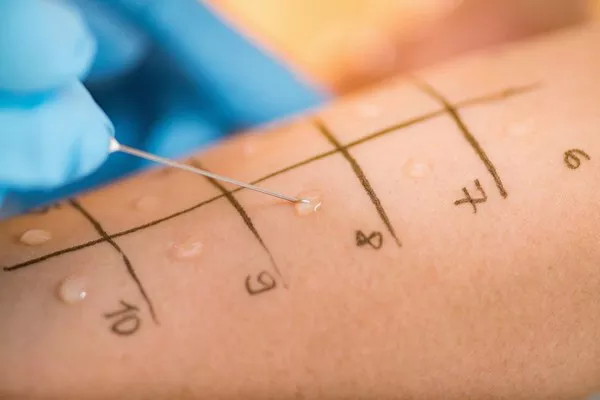Allergies can significantly impact daily life, prompting many individuals to seek relief through immunotherapy, commonly known as allergy shots. While these shots are highly effective in desensitizing the immune system to specific allergens, it’s not uncommon for individuals to experience reactions during or after administration. This article aims to shed light on normal and abnormal allergy shot reactions, differentiating between normal responses and signs that may require attention.
Allergy Shots:
Allergy shots, or allergen immunotherapy, involve injecting small and gradually increasing amounts of allergens under the skin. The purpose is to desensitize the immune system over time, helping the body build tolerance to substances that would otherwise trigger allergic reactions.
Common Allergy Shot Reactions: What’s Normal?
1. Local Reactions at the Injection Site: It’s quite common to experience redness, swelling, or itching at the injection site. These local reactions are typically mild and occur immediately after the shot. They are considered normal and usually subside within a short period.
2. Systemic Reactions: Some individuals may experience mild systemic reactions, such as sneezing, nasal congestion, or itching in areas other than the injection site. These reactions are generally a result of the immune system responding to the allergen and are considered a normal part of the desensitization process.
3. Fatigue: Feeling tired or fatigued after an allergy shot is not uncommon. The body is actively responding to the injected allergen, and some individuals may experience a temporary decrease in energy levels.
4. Low-Grade Fever: A slight increase in body temperature, often referred to as a low-grade fever, may occur. This is a normal response to the immune system’s activation and is usually mild and short-lived.
5. Delayed Reactions: Occasionally, individuals may experience delayed reactions, such as increased allergy symptoms, several hours after the injection. These delayed responses are still considered within the spectrum of normal reactions and often resolve on their own.
When to Seek Medical Attention: Identifying Abnormal Reactions:
While the aforementioned reactions are generally considered normal, certain signs may indicate an abnormal response that warrants immediate medical attention. It’s crucial for individuals receiving allergy shots to be aware of these signs and to seek help if they experience:
1. Severe Swelling or Hives: If there is a significant and rapid swelling of the face, lips, or throat, or if hives develop beyond the injection site, it could indicate a more serious allergic reaction known as anaphylaxis. This requires immediate medical attention.
2. Difficulty Breathing or Wheezing: Difficulty breathing, wheezing, or a persistent cough may be indicative of respiratory distress. Any signs of respiratory distress should be addressed promptly, as they could signify a severe reaction.
3. Chest Tightness or Pain: Chest tightness or pain is a serious symptom that may suggest an adverse reaction. It’s essential to seek medical help if these symptoms arise during or after an allergy shot.
4. Rapid or Irregular Heartbeat: An unusually rapid or irregular heartbeat is another potential indicator of a severe reaction. Immediate medical evaluation is necessary if this occurs.
5. Dizziness or Fainting: Feeling dizzy or fainting can be a sign of a more severe reaction. Individuals experiencing these symptoms should seek medical attention promptly.
Preventing and Managing Allergy Shot Reactions:
Pre-Treatment with Antihistamines: Taking antihistamines before an allergy shot may help reduce the risk of mild reactions. However, individuals should consult their healthcare providers before using any medications in conjunction with allergy shots.
Observation Period: Healthcare providers typically observe patients for 15 to 30 minutes after administering allergy shots to monitor for immediate reactions. This observation period allows for prompt intervention if any concerning symptoms arise.
Communication with Healthcare Providers: Open communication with healthcare providers is essential. Individuals should report any unusual or severe reactions to their healthcare team, as adjustments to the treatment plan may be necessary.
Adherence to Treatment Schedule: Consistent adherence to the prescribed allergy shot schedule is crucial for optimal effectiveness. Missing doses or extending intervals may impact the desensitization process and increase the risk of reactions.
Conclusion
Allergy shots are a valuable tool in managing allergies and can lead to long-term relief for many individuals. Understanding the range of normal reactions, from mild local responses to temporary systemic effects, is essential for those undergoing allergen immunotherapy.
While most reactions are within the expected spectrum, it is crucial to recognize signs of abnormal responses that may require immediate medical attention. A collaborative and communicative relationship with healthcare providers ensures that individuals receiving allergy shots can navigate the treatment process safely and effectively.
As with any medical intervention, individuals should consult their healthcare providers to discuss specific concerns, potential reactions, and the overall management of their allergy shots. With proper attention and guidance, the journey through allergen immunotherapy can pave the way for a life with reduced allergy symptoms and improved overall well-being.


